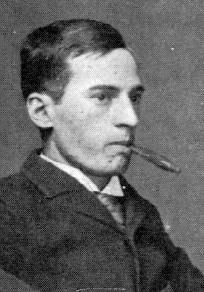Harry Pillsbury
| Harry Pillsbury | |
|---|---|

Harry Nelson Pillsbury
|
|
| Full name | Harry Nelson Pillsbury |
| Country | United States |
| Born |
December 5, 1872 Somerville, Massachusetts, United States |
| Died | June 17, 1906 (aged 33) |
Harry Nelson Pillsbury (December 5, 1872 – June 17, 1906) was a leading American chess player. At the age of 22, he won one of the strongest tournaments of the time (the Hastings 1895 chess tournament) but his illness and early death prevented him from challenging for the World Chess Championship.
Pillsbury was born in Somerville, Massachusetts, moved to New York City in 1894, then to Philadelphia in 1898.
By 1890, having only played chess for two years, he beat noted expert H. N. Stone. In April 1892, Pillsbury won a match two games to one against World Champion Wilhelm Steinitz, who gave him odds of a pawn. Pillsbury's rise was meteoric, and there was soon no one to challenge him in the New York chess scene.
The Brooklyn chess club sponsored his journey to Europe to play in the Hastings 1895 chess tournament, in which all the greatest players of the time participated. The 22-year-old Pillsbury became a celebrity in the United States and abroad by winning the tournament, finishing ahead of reigning world champion Emanuel Lasker, former world champion Wilhelm Steinitz, recent challengers Mikhail Chigorin and Isidor Gunsberg, and future challengers Siegbert Tarrasch, Carl Schlechter and Dawid Janowski.
The dynamic style that Pillsbury exhibited during the tournament also helped to popularize the Queen's Gambit during the 1890s, including his famous win over Siegbert Tarrasch.
His next major tournament was in Saint Petersburg the same year, a six-round round-robin tournament between four of the top five finishers at Hastings (Pillsbury, Chigorin, Lasker and Steinitz; Tarrasch did not play). Pillsbury appears to have contracted syphilis prior to the start of the event. Although he was in the lead after the first half of the tournament (Pillsbury 6½ points out of 9, Lasker 5½, Steinitz 4½, Chigorin 1½), he was affected by severe headaches and scored only 1½/9 in the second half, ultimately finishing third (Lasker 11½/18, Steinitz 9½, Pillsbury 8, Chigorin 7). He lost a critical fourth cycle encounter to Lasker, and Garry Kasparov has suggested that had he won, he could well have won the tournament and forced a world championship match against Lasker.
...
Wikipedia
